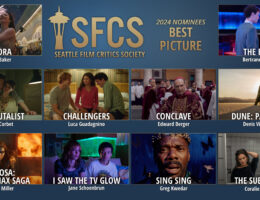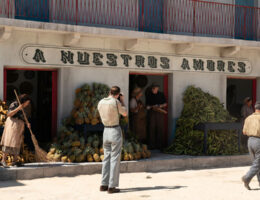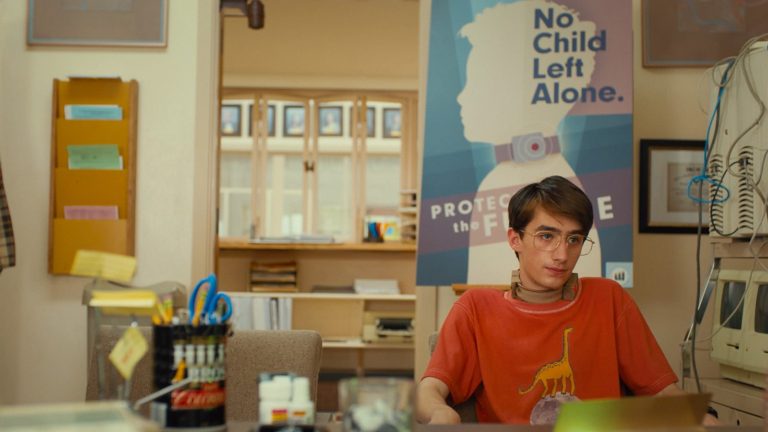My SIFF watchlist hit a patch of coming-of-age movies over the last few days. It’s a tried and true genre with familiar beats. Despite sometimes striking filmmaking and relevant stories, a couple of them — like Official Competition entries When I’m Done Dying (in which a young rapper in Istanbul’s drug use sends him spiraling into self-destruction) and Goddess of the Fireflies (in which a teen girl in Quebec gets into drugs and spirals into self-destruction) — were just not the right fit for my current mindset, screening situation. Whereas I may have surrendered to their languidly-paced explorations of drugged-out kids in an in-person screening, I have to admit a sense of relief at remembering that my AppleTV has a fast-forward button so that I could confirm that, yes, these are going exactly where I expected them to go (exhausting almost every possible tragedy or misstep). A few others, though, had enough of a twist on the genre or point of view to hold my increasingly scattered attention.
Wyrm (2019 | USA | 97 minutes | Christopher Winterbauer)
With its bright primary colors and pervasive strains of deadpan melancholy, one might accuse Christopher Winterbauer of assembling his alternative universe depiction of adolescent awkwardness from a Wes Anderson Starter Kit but that’s not necessarily a bad thing. Expanded from a Sundance short, the full-length has Theo Taplitz (so good in Ira Sachs’s Little Men) in the title role as the last of the incoming freshmen class to “pop his collar”, an absurdly ill-considered dystopian loneliness-prevention program in which kids are electronically monitored for their first osculations. His twin sister (Lulu Wilson, channeling Big Dawn Weiner Energy) is a few bases ahead of him in terms of blossoming into adulthood race, his older star athlete brother died recently, his parents have essentially abandoned their surviving kids to the custody of a Cool Uncle whose culinary repertoire starts and ends with nachos. As Wyrm makes the rounds in town collecting audio recordings for his brother’s memorial, Taplitz conveys a sense of forlorn longing and confused grief undergirding a near-infinite wardrobe of quirky dinosaur t-shirts. Once the primary achievement is unlocked, the movie loses its footing a bit before recalibrating, but this feature debut has more than enough heart, aesthetics, dry humor, and deep bench of visual gags to compensate.
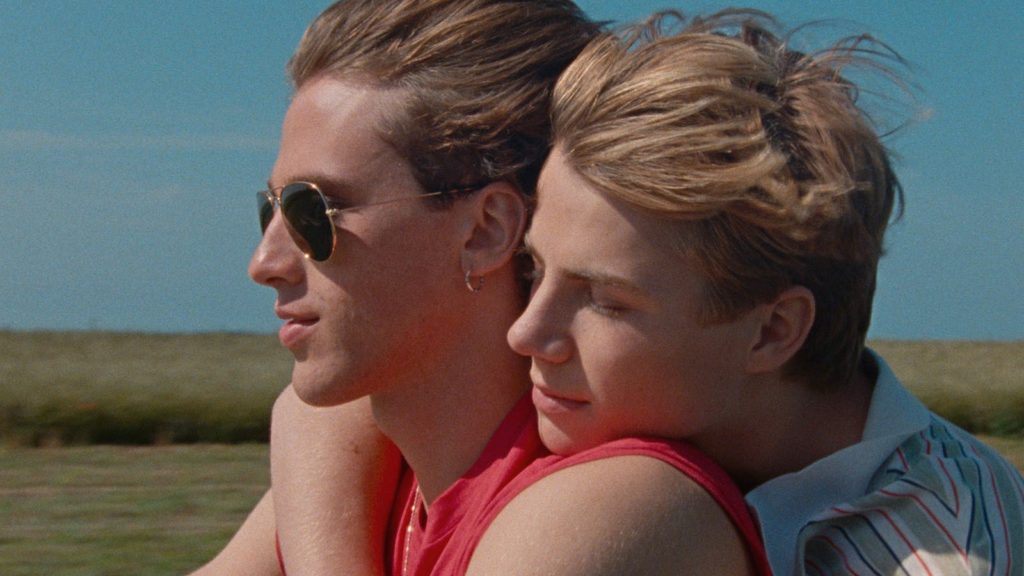
Summer of 85 (2020 | France | 101 minutes | François Ozon)
We meet Alex (nee Alexis), the moody blond self-mythologizing hero of François Ozon’s latest (an adaptation of Dance on My Grave by Aidan Chambers), as a policeman marches him from a dark holding cell to a bench outside a courtroom where his fate hangs in the balance. His grandiose internal monologue begins with “If your hobby is death, you must be mad” and provocatively warns that we should stop now if we don’t want to know how one specific corpse (that had a terrible effect on him) came to be a corpse. So at least we know what we’re in for when, not exiting the screening, we smash cut to a sunny Normandy boardwalk soundtracked to the Cure where Alexis borrows a friends sailboat, finds his scantily-clad sunbathing session interrupted by a squall, promptly capsizes, and is rescued by a handsome older sailor named David who takes him home, where his bizarrely forward mother undresses him, complements the contents of his Speedo, and tosses him into a bubble bath. You know, very French eighties stuff. Like his mother, David is an all-in sort of guy and instantly claims “little bunny” Alex as his constant companion.
It’s a stretch, but one can excuse the glossy retro-fantasy of this instantaneous and dramatized relationship through the structure of the film. The action in the gloomy present day is driven by a caseworker’s attempts to piece together the circumstances that led to Alex’s near-criminal transgression. Unlike an American Crime Story, which might find a caring detective collecting evidence and interviews, this French counterpart relies entirely on waiting for the accused to reveal his motivations and detailed backstory through hammering out an autobiography on a portable typewriter. As such, the borderline leering camerawork as the boys fall into an uncomplicated romance, complete with stolen kisses in the storeroom, tastefully coy lovemaking, enchanted evenings at the cinema, romantic roller coaster rides, and magic hour motorcycle rides play out with perhaps the literary flair of a lovelorn teenager. So too, does the heightened drama surrounding the eventual reveal of the corpse, cause of death, and melodramatic aftermath. It’s all kind of ridiculous upon ridiculous, but Ozon a competent filmmaker and this kind of titilation with a streak of darkness is right in his wheelhouse. Who can resist a little dramatic summer beach fling?
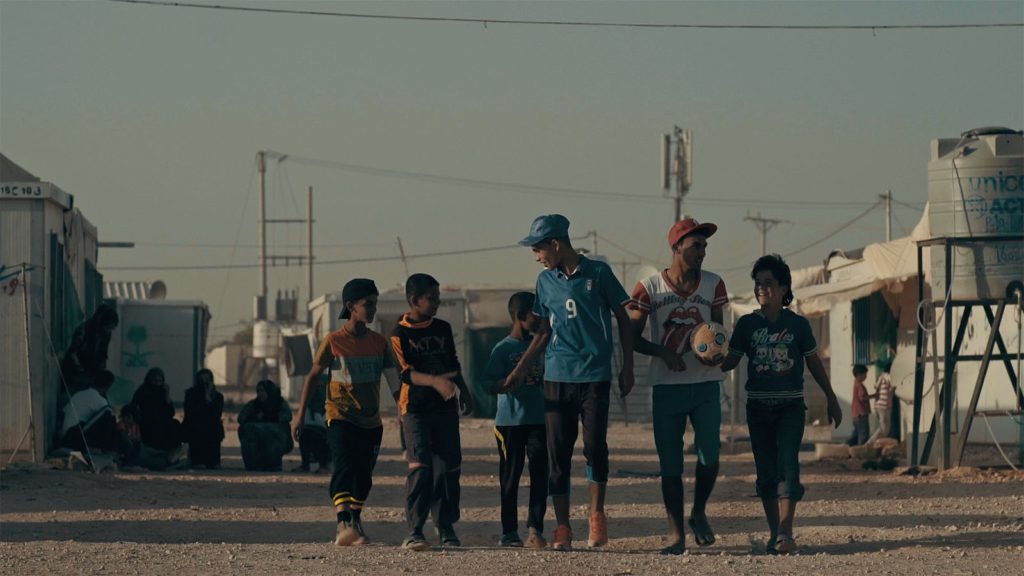
Captains of Zaatari (2021 | Egypt | 75 minutes | Ali El Arabi)
I recently complained about the trend in the Documentary Competition of slowly parceling out establishing details through showing rather than simply using title cards or interviews to establish settings. There’s a little bit of that in Captains of Zaatari, which takes its time to parcel out the particulars of its soccer-loving teen subjects Fawzi and Mahmoud. While the depth of their friendship and their affection for each other are instantaneously clear, how the Syrian teens came to be refugees in a camp in Jordan, how long they’ve been living there, and details about the soccer tournament that they long to qualify for remain opaque or are only gradually revealed in context. Nevertheless, it’s my favorite documentary of the festival.
Even though its a bit confusing, in this compact and highly effective sports documentary, the strategy works to accomplish Egyptian journalist and filmmaker Ali El Arabi’s goal of humanizing their unique experience rather than allowing them to blend, faceless, into numbing statistics of war-displaced refugees. Through unobtrusive, closely observed footage, we meet each of the boys in camp, with their dreams of what a professional soccer career could mean to each of them, as an introduction to their different family situations and goals for the future. Compelling wide-angle camerawork captures their prowess on the dusty pitch as they audition for a somewhat mysterious selection committee. At night, when there’s spare internet, we follow as the boys hang out by chilly fences on the outskirts of camp to catch up on texts and gently rib each other about burgeoning romances. Like any good sports documentary, there are obstacles to be overcome, emotional reunions, tough talk from coaches in locker rooms, that all culminate in a big game watched by everyone in the village. Some of the scenes from their dream trip to an elite training facility in Doha — like the boys sneaking out at night to kick a ball around barefoot on a lush field — are so lyrical and hopeful that they provide a brief respite from the looming impossibilities of the the global refugee crisis.
Which, again, may have been largely the point. Perhaps the most sobering part of the story wasn’t included in the film at all: in a pre-recorded Q&A, El Arabi casually mentioned that he spent more than seven years forging a friendship with and filming these remarkable young men. By focusing the primary action on these few months, the engaging documentary remains moving, heartwarming, and optimistic without ever succumbing to naïveté.
All three films are playing as part of the 47th Seattle International Film Festival through April 18. Images courtesy SIFF.

